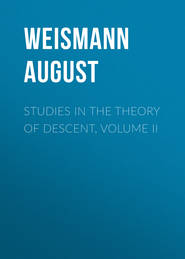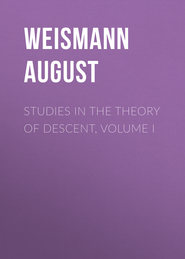По всем вопросам обращайтесь на: info@litportal.ru
(©) 2003-2024.
✖
Essays Upon Heredity and Kindred Biological Problems
Автор
Год написания книги
2018
Настройки чтения
Размер шрифта
Высота строк
Поля
171
The same fact has since been ascertained in species belonging to several groups of animal.
172
Brooks, ‘The Law of Heredity.’ Baltimore, 1883, p. 73.
173
‘Zeitschrift für wissenschaftliche Zoologie,’ Bd. XXXIII. p. 107. 1873.
174
Valaoritis, l. c., p. 6.
175
I quote from Falkenberg, in Schenk’s ‘Handbuch der Botanik,’ Bd. II. p. 219. He further states that these are the only instances hitherto known in which undoubted male cells have proved to be capable of further development when they have been unable to exercise their powers of fertilization. It must be added that the two kinds of germ-cells do not differ in appearance, but only in behaviour; the female germ-cells becoming fixed, and withdrawing one of their two flagella, while the male cells continue to swarm. But even this slight degree of differentiation requires the supposition of internal molecular differentiation.
176
C. Nägeli, ‘Mechanisch-physiologische Theorie der Abstammungslehre.’ München u. Leipzig, 1884.
177
‘Ueber die Berechtigung der Darwin’schen Theorie.’ Leipzig, 1868, p. 27.
178
l. c., Preface, p. vi.
179
Since the above was written many other morphological peculiarities of plants have been rightly explained as adaptations. Compare, for instance, the investigations of Stahl on the means by which plants protect themselves against the attacks of snails and slugs (Jena, 1888).—A. W., 1888.
180
l. c., pp. 117, 286.
181
Compare the second and fourth of the preceding Essays, ‘On Heredity’ and ‘The Continuity of the Germ-plasm as the Foundation of a Theory of Heredity.’
182
Compare Rauber, ‘Homo sapiens ferus oder die Zustände der Verwilderten.’ Leipzig, 1885.
183
‘Sitzungsberichte der baierischen Akademie der Wissenschaften,’ vom 18 Nov. 1865. Compare also his ‘Mechanisch-physiologische Theorie der Abstammungslehre,’ p. 102, etc.
184
Jordan, ‘Remarques sur le fait de l’existence en société des espèces végétales affines.’ Lyon, 1873.
185
S. Hermann’s ‘Handbuch der Physiologie,’ Theil II; ‘Physiologie der Zeugung,’ by V. Hensen.
186
E. van Beneden, ‘Recherches sur la maturation de l’œuf, la fécondation et la division cellulaire.’ Gand u. Leipzig, 1883, pp. 404 et seq.
187
Rolph, ‘Biologische Probleme.’ Leipzig, 1882.
188
Cienkowsky, ‘Arch. f. mikr. Anat.,’ ix. p. 47. 1873.
189
Hensen, ‘Physiologie der Zeugung,’ p. 139.
190
Coalescence takes place in the so-called bud-like conjugation of Vorticellidae and Trichodinidae, etc.
191
Compare (1) Bardeleben, ‘Zur Entwicklung der Fusswurzel,’ Sitzungsber. d. Jen. Gesellschaft, Jahrg. 1885, Feb. 6; also ‘Verhandl. d. Naturforscherversammlung zu Strassburg,’ 1885, p. 203; (2) G. Baur, ‘Zur Morphologie des Carpus und Tarsus der Wirbelthiere,’ Zool. Anzeiger, 1885, pp. 326, 486.
192
In frogs the sixth toe exists in the hind legs as a rudimentary prehallux. Compare Born, Morpholog. Jahrbuch, Bd. I, 1876.
193
I here make use of the same illustration which I employed in my first attempt to explain the effects of panmixia. Compare the second Essay ‘On Heredity.’
194
[E. Ray Lankester has suggested (Encycl. Britann., art. ‘Zoology,’ pp. 818, 819) that the blindness of cave-dwelling and deep-sea animals is also due to the fact that ‘those individuals with perfect eyes would follow the glimmer of light and eventually escape to the outer air or the shallower depths, leaving behind those with imperfect eyes to breed in the dark place. A natural selection would thus be effected.’ Such a sifting process would certainly greatly quicken the rate of degeneration due to panmixia alone.—E. B. P.]
195
Adler, ‘Zeitschrift f. wiss. Zool.,’ Bd. XXXV, 1881.
The same fact has since been ascertained in species belonging to several groups of animal.
172
Brooks, ‘The Law of Heredity.’ Baltimore, 1883, p. 73.
173
‘Zeitschrift für wissenschaftliche Zoologie,’ Bd. XXXIII. p. 107. 1873.
174
Valaoritis, l. c., p. 6.
175
I quote from Falkenberg, in Schenk’s ‘Handbuch der Botanik,’ Bd. II. p. 219. He further states that these are the only instances hitherto known in which undoubted male cells have proved to be capable of further development when they have been unable to exercise their powers of fertilization. It must be added that the two kinds of germ-cells do not differ in appearance, but only in behaviour; the female germ-cells becoming fixed, and withdrawing one of their two flagella, while the male cells continue to swarm. But even this slight degree of differentiation requires the supposition of internal molecular differentiation.
176
C. Nägeli, ‘Mechanisch-physiologische Theorie der Abstammungslehre.’ München u. Leipzig, 1884.
177
‘Ueber die Berechtigung der Darwin’schen Theorie.’ Leipzig, 1868, p. 27.
178
l. c., Preface, p. vi.
179
Since the above was written many other morphological peculiarities of plants have been rightly explained as adaptations. Compare, for instance, the investigations of Stahl on the means by which plants protect themselves against the attacks of snails and slugs (Jena, 1888).—A. W., 1888.
180
l. c., pp. 117, 286.
181
Compare the second and fourth of the preceding Essays, ‘On Heredity’ and ‘The Continuity of the Germ-plasm as the Foundation of a Theory of Heredity.’
182
Compare Rauber, ‘Homo sapiens ferus oder die Zustände der Verwilderten.’ Leipzig, 1885.
183
‘Sitzungsberichte der baierischen Akademie der Wissenschaften,’ vom 18 Nov. 1865. Compare also his ‘Mechanisch-physiologische Theorie der Abstammungslehre,’ p. 102, etc.
184
Jordan, ‘Remarques sur le fait de l’existence en société des espèces végétales affines.’ Lyon, 1873.
185
S. Hermann’s ‘Handbuch der Physiologie,’ Theil II; ‘Physiologie der Zeugung,’ by V. Hensen.
186
E. van Beneden, ‘Recherches sur la maturation de l’œuf, la fécondation et la division cellulaire.’ Gand u. Leipzig, 1883, pp. 404 et seq.
187
Rolph, ‘Biologische Probleme.’ Leipzig, 1882.
188
Cienkowsky, ‘Arch. f. mikr. Anat.,’ ix. p. 47. 1873.
189
Hensen, ‘Physiologie der Zeugung,’ p. 139.
190
Coalescence takes place in the so-called bud-like conjugation of Vorticellidae and Trichodinidae, etc.
191
Compare (1) Bardeleben, ‘Zur Entwicklung der Fusswurzel,’ Sitzungsber. d. Jen. Gesellschaft, Jahrg. 1885, Feb. 6; also ‘Verhandl. d. Naturforscherversammlung zu Strassburg,’ 1885, p. 203; (2) G. Baur, ‘Zur Morphologie des Carpus und Tarsus der Wirbelthiere,’ Zool. Anzeiger, 1885, pp. 326, 486.
192
In frogs the sixth toe exists in the hind legs as a rudimentary prehallux. Compare Born, Morpholog. Jahrbuch, Bd. I, 1876.
193
I here make use of the same illustration which I employed in my first attempt to explain the effects of panmixia. Compare the second Essay ‘On Heredity.’
194
[E. Ray Lankester has suggested (Encycl. Britann., art. ‘Zoology,’ pp. 818, 819) that the blindness of cave-dwelling and deep-sea animals is also due to the fact that ‘those individuals with perfect eyes would follow the glimmer of light and eventually escape to the outer air or the shallower depths, leaving behind those with imperfect eyes to breed in the dark place. A natural selection would thus be effected.’ Such a sifting process would certainly greatly quicken the rate of degeneration due to panmixia alone.—E. B. P.]
195
Adler, ‘Zeitschrift f. wiss. Zool.,’ Bd. XXXV, 1881.








